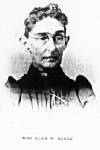Edmund Baker
 EDMUND BAKER.
There are few citizens of Weir City, who have been more closely identified with
its material growth, than Edmund Baker, the result of whose public spirit and
business enterprise may be seen in the substantial structures which line the
city's business streets, and the elegant mansions which adorn its choice
residence portions. Mr. Baker was born in 1841 in Somersetshire, England, and
is a son of Richard and Maria (Jenkins) Baker.
EDMUND BAKER.
There are few citizens of Weir City, who have been more closely identified with
its material growth, than Edmund Baker, the result of whose public spirit and
business enterprise may be seen in the substantial structures which line the
city's business streets, and the elegant mansions which adorn its choice
residence portions. Mr. Baker was born in 1841 in Somersetshire, England, and
is a son of Richard and Maria (Jenkins) Baker.
Richard Baker was born in Somersetshire, England, in 1808. He followed the trade of a brick-maker all of his life, and died in 1872, at Swansea, Wales. His wife was also born in Somersetshire, and died at Swansea, Wales, in 1902, when more than 90 years of age. Of the six children resulting from their union but two came to America, and but two still survive,—Edmund and his brother, Richard, now a resident of Indiana.
Edmund Baker came to America with his family in 1873 and resided at St. Louis, Missouri, until May, 1874, when he removed to Weir City, Kansas. He obtained employment in the smelting works, where he continued until 1889. In the meantime, about 1883, he bought 80 acres of land in section 33, township 31, range 24, in Cherokee township, Cherokee County, a most fortunate purchase both for Mr. Baker and for his chosen city of residence. It placed in his possession large capital, through the discovery of rich coal beds underlying it, and instead of settling down to an agricultural life, Mr. Baker leased the land until the coal was exhausted, and then, with sufficient means at command, platted it and named the suburb "Bakertown." Men of less business capacity and less public spirit, would then have retired from the field and left others to continue the improvement of this section, which is now one of the most desirable additions to the city. Mr. Baker, however, continued his operations, divided his property into city lots, and as he spent lavish sums in their adornment and improvement, they were sold at high figures, making him one of the large capitalists of the section. In 1883 he built his first house here, which he replaced in 1894 with his present elegant residence. He has also built other houses in the town. In 1891 he built the Edmund Baker Block, on Main street, Weir City, which is the finest modern structure in the place. Mr. Baker has not limited his energies to advancing his personal interests, his public spirit being shown by assistance given to many successful commercial enterprises and public works, and by the encouragement offered to educational institutions.
On January 1, 1862, at Swansea, Wales, Mr. Baker was married to Martha Fudge, who was born at Bristol, England. Five of their children were born on the other side of the Atlantic, namely: Walter, who married Egele Deaneve, and died at Weir City in 1902; Richard; William; Thomas, who married Susan Villiens, and has one child,—Martha; and Emily, who married Joseph Hanley, and has one son,—Walter. Two children, Martha and Maria (twins) were born in South St. Louis, Missouri, and died a few days after their birth.
Politically, Mr. Baker is a Democrat, and he has served six years as a councilman at Weir City. Fraternally, he is associated with the Masons, Odd Fellows, Knights of Pythias and the Ancient Order of United Workmen.
Only a man of energy and resolution and, at the same time, of good judgment and sterling qualities of head and heart, could have accomplished what Mr. Baker has done at Weir City. The good wishes of his fellow citizens have followed him into the retirement of private life. His portrait is shown on a preceding page.
![]()
History of Cherokee County Kansas and its representative citizens, ed. & comp. by Nathaniel Thompson Allison, 1904, transcribed by students from Baxter Springs Middle School, Baxter Springs, Kansas, 3/6/97.
